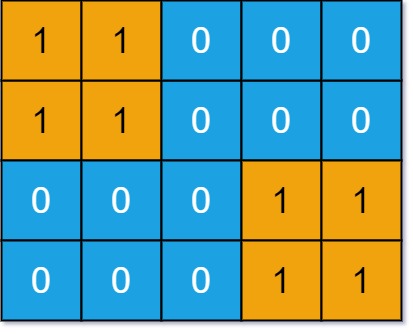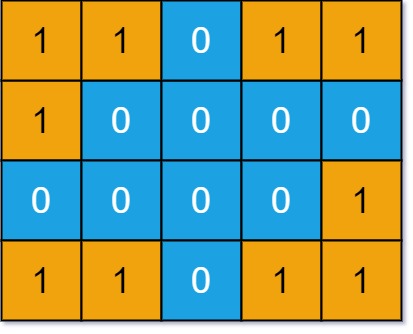| ID | Title | Difficulty | |
|---|---|---|---|
| Loading... | |||
694. Number of Distinct Islands
Medium
LeetCode
Hash Table, Depth-First Search, Breadth-First Search, Union Find, Hash Function
Problem
You are given an m x n binary matrix grid. An island is a group of 1’s (representing land) connected 4-directionally (horizontal or vertical.) You may assume all four edges of the grid are surrounded by water.
An island is considered to be the same as another if and only if one island can be translated (and not rotated or reflected) to equal the other.
Return the number of distinct islands.
Example 1:

Input: grid = [[1,1,0,0,0],[1,1,0,0,0],[0,0,0,1,1],[0,0,0,1,1]]
Output: 1
Example 2:

Input: grid = [[1,1,0,1,1],[1,0,0,0,0],[0,0,0,0,1],[1,1,0,1,1]]
Output: 3
Constraints:
- $m == grid.length$
- $n == grid[i].length$
- $1 <= m, n <= 50$
- $grid[i][j]$ is either 0 or 1.
Code
class Solution {
int[][] dirs = new int[][]{{-1, 0}, {1, 0}, {0, -1}, {0, 1}};
public int numDistinctIslands(int[][] grid) {
Set<String> set = new HashSet<>();
for (int i = 0; i < grid.length; i++) {
for (int j = 0; j < grid[0].length; j++) {
if (grid[i][j] == 1) {
StringBuilder s = new StringBuilder();
helper(grid, i, j, i, j, s);
set.add(s.toString());
}
}
}
return set.size();
}
private void helper(int[][] grid, int i0, int j0, int i, int j, StringBuilder s) {
grid[i][j] = 0;
s.append((i - i0) + "" + (j - j0));
for (int[] dir : dirs) {
int x = i + dir[0];
int y = j + dir[1];
if (x < 0 || x >= grid.length || y < 0 || y >= grid[0].length || grid[x][y] == 0) continue;
helper(grid, i0, j0, x, y, s);
}
}
}
按 <- 键看上一题!
693. Binary Number with Alternating Bits
按 -> 键看下一题!
695. Max Area of Island


